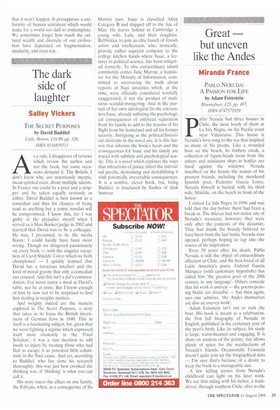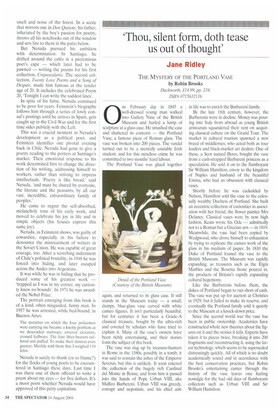Great—
but uneven like the Andes
Miranda France
PABLO NERUDA: A PASSION FOR LIFE by Adam Feinstein Bloomsbury, £25, pp. 497, ISBN 0747571929 pablo Neruda had three houses in Chile, the most lovely of them at La Isla Negra, on the Pacific coast near Valparaiso. This house is Neruda's love-song to the sea that inspired so many of his poems. Like a stranded boat on the beach, its timbers creak, a collection of figure-heads loom from the rafters and miniature ships in bottles are lined against the windows. Neruda inscribed on the beams the names of his greatest friends, including the murdered Spanish poet. Federico Garcia Lorca. Neruda himself is buried, with his third wife, Matilde, on the beach in front of the house.
I visited La Isla Negro in 1996 and was told that the day before there had been a break-in. The thieves had not stolen any of Neruda's treasures, however, they were only after the contents of the decanter. They had drunk the brandy believed to have been from the last bottle Neruda ever opened, perhaps hoping to tap into the source of his inspiration. Even 30 years after his death, Pablo Neruda is still the object of extraordinary affection in Chile, and the best-loved of all Latin America's poets. Gabriel Garcia Marquez (with customary hyperbole) has called him 'the greatest poet of the 20th century in any language'. Others concede that his work is uneven — the poems praising Stalin are dreadful — but then again, says one admirer, 'the Andes themselves are also an uneven work'.
Adam Feinstein isn't out to rock the boat. His book is meant as a celebration, the first full biography of Neruda in English, published in the centenary year of the poet's birth. Like its subject, his study is large, warm-hearted and engaging. It is short on analysis of the poetry, but allows plenty of space for the recollections of Neruda's friends. Occasionally Feinstein doesn't quite join up the biographical dots — I'm sure that's because of a desire to keep the book to a manageable size. A few telling scenes from Neruda's childhood cast light on his later work. We see him riding with his father, a traindriver, through southern Chile, alive to the smell and noise of the forest. In a scene that mirrors one in Don Quixote, his father, infuriated by the boy's passion for poetry, throws all his notebooks out of the window and sets fire to them in the patio below.
But Neruda pursued his ambition with determination. In Santiago, he drifted around the cafés in a pretentious poet's cape — which later had to be pawned — writing the poems for his first collection, Crepusculario. The second collection, Twenty Love Poems and a Song of Despair, made him famous at the tender age of 20. It includes the celebrated Poem 20, 'Tonight I can write the saddest lines'.
In spite of his fame, Neruda continued to be poor for years. Feinstein's biography follows him through a series of lowly consul's postings until he arrives in Spain, gets caught up in the Civil War and for the first time sides publicly with the Left.
This was a crucial moment in Neruda's development as a political poet, and Feinstein identifies one pivotal evening back in Chile. Neruda had gone to give a poetry reading to the porters at Santiago's market. Their emotional response to his work determined him to change the direction of his writing, addressing himself to workers, rather than striving to impress intellectuals. 'Poetry is like bread,' said Neruda. 'and must be shared by everyone, the literate and the peasants, by all our vast, incredible, extraordinary family of peoples.'
He came to regret the self-absorbed, melancholy tone of his early work, and moved to celebrate his joy in life and in simple objects (his houses express this same joy).
Neruda, as Feinstein shows, was guilty of cowardice, especially in his failure to denounce the mistreatment of writers in the Soviet Union, He was capable of great courage, too. After a scorching indictment of Chile's political brutality, in 1948 he was forced into hiding, and later escaped across the Andes into Argentina.
It was while he was in hiding that he produced some of his greatest work — 'trapped as I was in my corner, my curiosity knew no bounds'. In 1971 he was awarded the Nobel Prize.
The portrait emerging from this book is of a kind, often misguided, funny man. In 1957 he was arrested, while bed-bound, in Buenos Aires:
The stretcher on which the four policemen were carrying me became a knotty problem as we descended stairways, entered elevators, crossed hallways. The four litter-bearers suffered and puffed. To make their distress even greater. Matilde told them that I weighed 110 kilos.
Neruda is surely to thank (or to blame?) for the flocks of young poets to be encountered in Santiago these days. Last time I was there one of them offered to write a poem about my eyes — for five dollars. It's a moot point whether Neruda would have approved of this petty capitalism.



























































 Previous page
Previous page